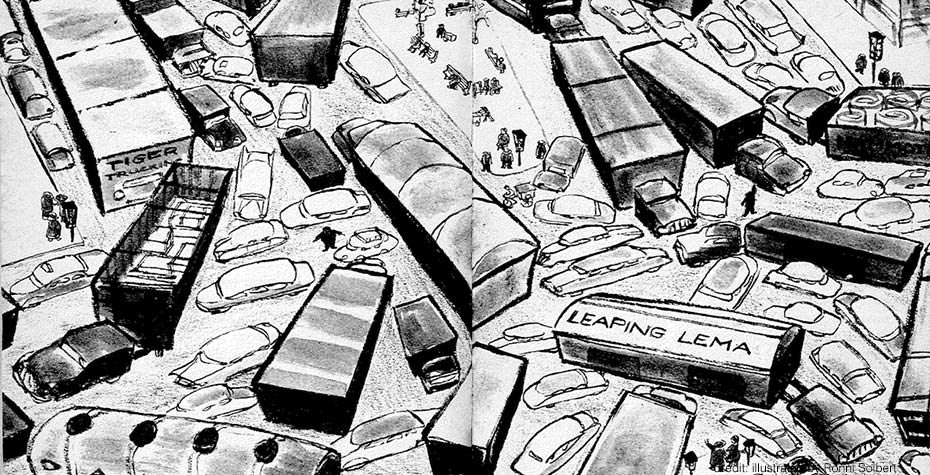What Do Nancy Drew and The Pushcart War Have in Common? Wellesley!

2014 marks anniversaries for two iconic children’s stories told by Wellesley alumnae. Harriet Stratemeyer Adams (Class of 1914) graduated 100 years ago, before going on to lead her father’s legendary Stratemeyer Syndicate and overseeing many of the later books in the Nancy Drew series. A second classic, The Pushcart War by Jean Merrill ’45, marked its 50th anniversary this year.
When Harriet Stratemeyer came to Wellesley as a first-year, she would have walked into the magnificent College Hall building. In mid-March of her senior year, Stratemeyer and her fellow students would have awoken to the sounds and smells of College Hall burning. One wonders whether the experience of watching College Hall burn inspired any of Stratemeyer’s later mystery stories.
After graduation, Stratemeyer joined her father’s Stratemeyer Syndicate, a group of writers that published books collectively; and she married and became Harriet Stratemeyer Adams. In her career at the syndicate, she began contributing to and supervising a series of stories based on a character her father had created—Nancy Drew, a girl detective with a talent for crime-fighting and a blue car—under the syndicate pseudonym Carolyn Keene. While Stratemeyer Adams shared writing responsibilities with the other members of the syndicate, she played an important role in shaping the series that captured the imagination of millions.
One article concerning the first Nancy Drew Conference described the iconic young detective as “a roadster-driving, mystery-solving heroine who uses her wit to survive being attacked with a hairbrush, wrapped in a sheet, and drugged with a sleeping potion (The Sign of the Twisted Candle). She escapes, unscathed, from a slimy cistern (The Password to Larkspur Lane) and survived a fall down a flight of steps (The Hidden Staircase). And her motives are unceasingly noble.”
Over the course of her life, Stratemeyer Adams wrote or contributed to several hundred novels, including contributions to other classic series The Hardy Boys and The Bobbsey Twins. She received the Alumnae Achievement Award in 1978.
Jean Merrill, who received an M.A. from Wellesley in English at a time when the College offered graduate degrees, became an editor for Scholastic after graduation and then a writer of distinguished, intelligent children’s books. According to the New York Times, “Ms. Merrill created books noted for their humanitarian worldview, complex plots, and huge casts of characters, which always included a host of fellow underdogs with whom her protagonist could make common cause.”
Her best known work is The Pushcart War. Set several years in the future, The Pushcart War contains a faux-historical account of a conflict between small pushcart peddlers and the enormous, bullying trucks who take over the streets of New York. Determined to fight back, the pushcart peddlers launch a guerrilla war against the trucks, beginning—quite memorably—with peashooters, and progressing from there. The story has had an impact on generations of children and adults who read and loved it. Playwright Tony Kushner even wrote a script for the story.
Remembering the impact of Merrill’s work on his life, Peter Baker wrote in the New Yorker: “[My] strongest memory of reading the book as a child has little to do with its plot or characters, and more to do with its humor and the appeal of its faux-historical form. I knew that the Pushcart War had never actually happened–not in 1976, not in 1986, not ever. And yet the book felt tethered to the real world in a way I hadn’t yet encountered in fiction. By presenting an imaginary future in a mode that I associated, thanks to my school readings, with stories about the real past, Merrill got me thinking: eventually, inevitably, my ‘now’ would become the past written about in history books that have not yet been written.”
The Daily Shot has been revised to reflect the following correction. (12/26/2014) An earlier version of this article misstated Ms. Adams' involvement in the creation of the Nancy Drew series. According to the New York Times, after her father's death in the 1930's, Ms. Adams became a senior partner in Stratemeyer Syndicate, a group of writers employed to write books for the series. The Times reports that "although Mrs. Adams did not write all of the books in the series, she retained editorial control over their contents" and explains that typically, "one of the syndicate writers would draw up a chapter-by-chapter outline. Then one of the syndicate members or a freelance writer would write the book, subject to final editing by a member of the syndicate." Most of the early volumes were written by Mildred Benson. We apologize for the error.
